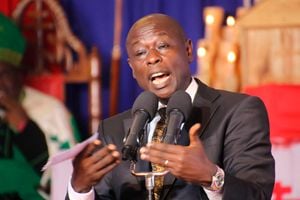
From left: Safaricom Telecommunications Ethiopia CEO Wim Vanhelleputte, Safaricom Chief Executive Peter Ndegwa and Chief Finance Officer Dilip Pal during the firm's 2023/2024 half-year financial results briefing on November 9, 2023, at Michael Joseph Centre.
| File | Nation Media GroupBusiness
Premium
Safaricom signals higher dividend on better-than-expected profit
Safaricom Plc has signalled a raise in its dividend payout to shareholders under the current financial year after posting a better-than-expected profit for the half year to September despite significant startup costs in Ethiopia.
The telco revised its forecast for full-year earnings before interest and tax at group level from a range of Sh75 billion to Sh81 billion to a range of Sh87 billion to Sh93 billion.
This is despite the Sh27.1 billion net profit for the six-month period, marking a 10.1 percent drop from last year.
The revision is largely based on better-than-expected earnings for its Kenyan operations which returned a net profit of Sh41.6 billion, a 10.9 percent year-on-year growth from last year.
The performance of the Kenyan unit helped calm the nerves of investors, in what saw its share price jump 6.8 percent to close 13.30 on Thursday.
This made the telco the highest traded counter at the Nairobi Securities Exchange (NSE) with a turnover of Sh230.1 million which helped bring some respite to the market rout as the Nairobi All Share Index closed the day with gains of 1.91 points to close at 88.32 points.
The NSE 25 Share Index and the NSE 10 Index equally gained by 17.74 points and 6.69 points to close the day at 2299.32 points and 881.03 points respectively.
Safaricom’s six-month performance was largely anchored on its Kenyan business which saw momentum from the growth in M-Pesa revenues, mobile data and fixed data services which include fibre to the home.
Growth in M-Pesa and data revenues was partly attributable to price cuts handed down to customers by the telecoms operator over recent years with the company having, for instance, effected 61 percent M-Pesa tariff reductions between 2021 and 2023.
“We have delivered a very strong growth performance at group level, which is primarily because we offered more affordable services to our customers. We have reduced prices across the board and in addition to that, we have ensured that customers are able to get services and propositions that meet their needs in a tough operating environment,” Safaricom Plc CEO Peter Ndegwa said on Thursday.
Safaricom normally distributes at least 80 percent of its net income to shareholders in the form of dividends, implying that the telco would raise its payout on higher profitability.
In its financial year to March 2023, the company declared a total dividend payout of Sh1.20 or Sh48.08 billion, inclusive of 58 cents or Sh23.2 billion interim dividends.
The payout was nevertheless lower than the total dividend per share of Sh1.39 or Sh55.69 billion, which is traceable to reduced earnings from higher capital expenditure from the expansion of operations in Ethiopia.
On Thursday, Safaricom indicated it would still be in line to pay an interim dividend early next year in line with its dividend policy.
“It’s unlikely that will change (the payment of an interim dividend). The dividend policy remains unchanged. It is likely we will pay an interim dividend at the same time we did last year,” noted Safaricom chief operating officer Dilip Pal.
Ethiopia is expected to be a drag on the group's profitability until it breaks even in the year ending March 2026 as per the telco’s projections.
Safaricom expects losses under earnings from its Ethiopia operations -- before interest, taxes, depreciation and amortisation -- to peak in March next year as the unit turns towards profitable growth.
During the six months, Safaricom Ethiopia marked key milestones, largely, the rollout of mobile money services with 1.2 million customers signing up to the M-Pesa platform and the total value of transactions over the period reaching Sh43.7 billion.
The unit’s network coverage meanwhile reached 2,057 sites, passing 22 cities or 30 percent of the Ethiopian population. The business now has 4.1 million active customers over three months in one year since its launch.
During the period, Safaricom retired a Sh18.1 billion ($120 million) loan taken for its Ethiopia operation to minimise its exposure to forex losses represented by foreign currency-denominated levels.
Safaricom Ethiopia had total revenues of Sh2.8 billion in the six months but operating costs were higher at Sh10.4 billion. Combined, Safaricom Plc marked a 9.9 percent growth in service revenues. M-Pesa revenues grew 16.5 percent to Sh66.2 billion, driven largely by personal and business payments.
Mobile data revenues meanwhile grew by 17.7 percent to Sh30.9 billion on the increased usage of data per customer while revenues from fixed data services were up 9.1 percent to Sh7.3 billion.
Safaricom’s traditional business, however, registered mixed results, with messaging revenues rising by 6.3 percent to Sh5.7 billion while voice revenues fell by 1.9 percent to Sh39.1 billion.
M-Pesa is Safaricom’s leading revenue earner, with its contribution to service revenue rising to 42 percent in the six months.





